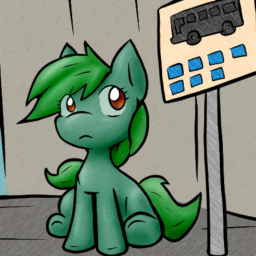
Some of the former crew of the USS California decided they didn't want to see the submarine being carved into tiny pieces. So, the ten of them decided to take their accumulated money and go start a new life, where they knew friends were. Calling the Subvets of Las Vegas...
A Ponies after People tale, as started by Starscribe, set in the 'Sin Never Dies' timeline as started by TheMixtapeHorse.
























It feels like you're on a quest to help improve our ratio of complete/incomplete stories. If persistence is a heavenly virtue you've surely got it in abundance, so let me see what useful comment I can provide.
First, a high-level note. Stories without covers have a much weaker chance of being seen. Even if all you can find is a stock photo of some climate stuff, or a landscape, or maybe you're lucky and you can find some pony art that matches... whatever you can do, ANYTHING is better than nothing. A cover is the key to escaping the gray ghetto.
Second, your description doesn't mention anywhere that it's a ponies after people story. I see this as two kinds of potential negative--readers who see your description and are won over might feel betrayed when they start reading and discover they don't have the understanding of the setting to appreciate it. Worse, someone who does have that understanding and might've read it might not realize what it is, particularly if they get here somehow _other_ than following the link from within the group. It is within your best interests to be up-front about what universe the story belongs to.
Now that the up-front stuff is out of the way, let's get started! I think I've said this kind of thing before, but it's been awhile so I'll say it again. I'm a terrible cheerleader. Mostly I'm here because I'm trying to help you excel, so there's little to say about the things you're already doing right. I know this can be discouraging, even knowing someone has the best of intentions. That's little consolations when someone tells you one of your babies has a crooked nose, or maybe ugly teeth or something. But I thought I'd reinforce it anyway just in case it helps.
Before I get into this, I have a question for you. It's a question that every writer must ask themselves eventually. Some of us lie to ourselves about the answer--but this isn't productive. Understanding the answer to this question can save us much heartache.
Are you writing for yourself, or to entertain others? This question is not a value judgement. It doesn't speculate about the superiority of one option over the other. But here's the thing: someone who's writing for themselves--for the fun of it, for the escapism, for any number of things--ultimately improving their craft doesn't matter. To be blunt for a second, the quality of the story doesn't matter so long as they're getting satisfaction out of it.
I think the answer can change over an author's career, too. When I was younger I wrote the stories I wanted for my own satisfaction. But over time, my desires shifted--I wanted to create for others to enjoy.
And here's why I ask the question. If your honest answer to yourself is "the one I want to entertain most with my stories is me," then you should probably stop reading my message right here. Someone who writes for their own enjoyment isn't really in a place to accept criticism--they'll defend their story instead, argue why the advice doesn't apply to them, or why they knew better in this specific case. Reading suggestions will only cause heartache if that's true for you, and this is where you should stop in my comment.
If you're continuing, let me confide in you a moment. I'm in a writing group of other semi-professional authors, all of which are trying to be published conventionally in the next five years. I recently finished an original novel, and we read over it together. When we did, I got some extremely harsh criticism--some fundamental changes would be necessary to raise the quality of this story high enough to sell.
It hurt, a lot. To learn that this thing I loved so much, that I had poured my heart and soul into, fought tooth and nail to finish... that it was so flawed. But when the pain was over, when I recovered from the shock, I realized what a favor my writing friends had done me. They weren't trying to be mean, they were pointing out the serious weaknesses I was blind to. They wanted my book to have the best chance it could have.
They weren't right about everything. A few things I'm determined not to change. But almost everything, I see now how right they were. I'm going to take their suggestions, and hopefully make this book good enough to sell.
Which takes us to where we are now. If my friends had only told me the good things about my story, and ignored all its flaws, I would've tried to sell a product that just wasn't good enough. If they had made a habit of telling me only MY strengths, and never pointed out my flaws as a writer, I'd never get any better. Is that a kindness? I don't think so.
So let me start with your strengths, at least as I see them (it goes without saying that everything I'm about to type is my opinion, so I won't say it again). With these strengths, I think you've got some real potential to hammer into great writing.
Firstly, you're a persistent hard worker. You finish what you start. This is something that can't be taught, and it's missing from the vast majority of writers on fimfiction. Just look in the incomplete side stories folder and weep with me.
Second, your grasp of English is impeccable, if utilitarian. You don't seem to be a poet, but you know how to assemble your sentences and express the thoughts you want. That's as much as any of us can hope for, as much as I ever had, and it's more than many aspiring writers have.
Third, you have a tremendous wealth of experiences to draw on. This makes the characters you choose to invest that in instantly realistic and grounded, even though you're writing about magical ponies.
Now, transitioning to your biggest weakness. With the exception of your very first PaP story, basically everything I've read of yours has this problem. It's the single thing stopping your stories from being more widely read. Certainly you work hard enough that more people should be reading these. The reason they don’t?
Narrative. Or, to be more precise, the fact that you almost never include one. Things happen in your stories... events take place one after another, but that isn't the same as a narrative. Simply having things happen in your story is not enough for a narrative. What is?
Simply speaking, a narrative is when a character is forced to confront an obstacle that they think they can't overcome. Then, through some kind of difficulty, struggle, and blood, the character is forced to transform who they are into a new person that's equal to the challenges before them, and they narrowly defeat their challenges by the skin of their teeth.
This is the essence of story, boiled down as fundamental as it can be. Almost anything about storytelling can be varied to such an infinite extent that "there is not right way to tell a story" is a common mantra. But this is an exception. Every story must have a narrative to grasp your readers and never let them go, and this is what you're lacking.
Your first story was an exception, and to a lesser extent so was "Stop that Blimp." But I'll talk about Dominic here, because he's a better example. He had many challenges to overcome when he woke up in the new world--but not only that, we credibly believed that he could be defeated by what was ahead of him. Dominic had to transform to some extent, changing his view on relationships and his place in the world, in order to find peace at the end of the story. There was a narrative here.
But most of your stories I've read--and I have read every single one of the PaP ones--are like this one. Though this one was a bad enough offender to prompt me to spend an hour typing up all this.
Instead of narrative, many of these stories feel like... have you ever visited a particularly boring relative in a retirement home, on a day you had other engagements? Your relative is kind and you're delighted to see them again, but there is no end to the stories they tell.
There are some interesting details in what they say, your relative is a real interesting person who went through a lot in their life, but they just go on and on and on. You keep trying to make excuses to leave, but they always call you back, insisting that you just have to hear about where cousin Mary worked after her second divorce, or that one time he saw a bear when he went kayaking up by Kodiak.
Here's what I mean: things happening are not story, they aren't narrative. Narrative comes from what I described above, where characters are forced to confront a terrible situation and have to grow and change as people to overcome them (or fail to do so and disaster strikes, as in tragedy. But I'm simplifying).
It's no mystery why "stop that blimp is your top-rated story. I think the characters don't really have to grow in that one, but at least they do spend the story facing a credible threat with real consequences if they fail. That's how you grab reader attention.
But so many of these aren't like that. So many of these feel like I'm being forced to watch twelve hours of unedited family vacation videos from someone I've never met. Yes, I'm sure that family really enjoyed their time there... but to put it bluntly, it's for them to enjoy and no one else.
You've written quite a few stories like this. Aside from this one, Ties of Family, Math Class, Three and Back Again, and Finding a New Home are the worst offenders.
Sometimes you start with a really interesting concept and just don't execute on the drama your challenging work should've earned you. I'm thinking of The Blizzard of 3265 here as the worst offender--you set up an excellent bit of conflict. Gave us some real stakes.
But instead of forcing the main character to confront the fact that they can't handle it, and maybe face some serious threats they have to rise to overcome--the whole thing goes off without a hitch. Hal Sleet easily stomps over the whole situation, showing supreme confidence and mastery the whole time. Basically the story is written like a superman comic without any kryptonite.
So my first bit of advice, assuming that all that was enough for you to see what I'm talking about, would be to look at EVERY story you write with the following questions in mind. Because this isn't that big a problem, much as it might seem like one. it's fairly easy to fix with the following cheat-sheet. Always follow it, and your stories will be five times more compelling overnight:
1. What person/force/organization/creature/god/event does my protagonist have to overcome in this story?
2. What are the serious negative consequences that my audience will care about if he/she fails?
3. What happens in the story to make it seem to my audience like my protagonist might not have what it takes to defeat this enemy?
4. What does my protagonist have to change about themselves to ultimately triumph in the end? What lesson do they have to learn, flaw they have to overcome, etc.?
Now you can do this exercise right now. Pick a story you enjoy and try to fill in the answers to those questions. Or, pick one of your own and see how it might be improved. Take this story for example.
1. Hal Sleet meets some old friends who need some help getting situated with new lives in Vegas.
2. None. They're millionaires and widely skilled. They are in no danger and in several cases left behind promising offers that would've placed them well in their lives. At worst, he's disappointing a friend, though even this isn't established.
3. Nothing. Hal Sleet instantly rises to the occasion and places each of them perfectly without effort. None of them gets placed wrong, gets rejected, or turns out not to be a good fit. He doesn't need to struggle at all.
4. Nothing. Hal Sleet is exactly the same at the end of the story as he was at the beginning, except that he did a favor for some old friends.
You'll find similar answers for many stories. You often try to establish a problem, but fall off the bandwagon somewhere down the line.
But that's why I'm trying to point this out! Because you have the talent for English, and enough experience to make some seriously realistic characters. But answer those questions--heck, print them in bold font and tape them to your computer screen--and you'll find yourself hooking far more readers, because you'll be telling much more interesting stories.
Some authors are afraid to challenge their characters. They love them so much they don’t want to hurt them and so they protect their creations from ever encountering a serious threat. Your writing suffers from this problem in a very serious way, and it’s another thing that makes it seem bland.
What do I mean? Think about your characters. Almost all of them of the right age end up in happy marriages, with plenty of kids. They don’t suffer serious setbacks in their lives, no crippling diseases, no betrayal. Rarely they’ll have anything more than a polite rivalry with someone at work, someone who really had no chance of challenging them and gets shown up time and again. This is doubly true for your protagonists, who are portrayed as hyper-competent and are pretty much universally loved and admired by the people around them in their lives. At very best, as in this story, there might be a little good-natured bickering between two happily married people as they proceed to pop out their kids.
This isn’t realistic, and it isn’t compelling. There’s a reason the Lord of the Rings stops once Frodo and Sam deal with the scourging of the Shire. Reading about a happy retirement is boring. The adventure was in their struggle, and once it’s done so is the story.
Almost done. I bet this beast of a comment feels a little like the scourging of the Shire too. That’s okay. It’s a good pain. It’s a pain that ends with you telling better stories.
Last but not least, and related to point two, your prose is flabby as heck. It goes so far as stories like this, where literally the entire thing will be extraneous detail about people’s lives or histories or careers. This probably seems a little hypocritical considering the insane length of this comment, but fortunately I’m not writing prose here. I’m allowed to be garbage at essay writing. >.>
This is the cause of what I said earlier, where I said your stories can read like being trapped in the retirement home of a beloved relative who doesn’t know when to let me leave. Here’s a pop quiz: What is the right wordcount for any story?
Answer: The minimum number required. When I write something, about 10% of my words end up getting trashed. Sometimes that number rises as high as 20%. Anything that isn’t serving to help convey the story I’m trying to tell—anything that isn’t telling the reader more about the protagonist’s struggle to overcome the obstacle—has got to go.
Long-winded tirades about how the Los Vegas weather system works? In the trash. Detailed explanation about how perfect Hal Sleet’s marriage is? Garbage disposal. Convoluted explanation about how some random person got promoted to the position they’re in now with the ARRRS? EXTERMINATE. None of this belongs in the story, absolutely none of it.
There is no 100% guaranteed checklist with this item, but there is a single rule of thumb you can follow. It will almost never fail you… but it does have rare exceptions, so don’t make it into a religion like the earlier checklist. Namely:
View any time the characters or the narrator talk about their own pasts with EXTREME SUSPICION. It is a near certainty that a character talking about the past is wasting everyone’s time. Yours writing the story, and mine in reading it.
You can see how this rule would have exceptions. Every now and again someone will genuinely want to know about someone else’s past. Like at a police interrogation, or if someone discovered their friend wounded after a terrible disaster.
When you must break this rule, be as concise as possible. Try to never have the narrator say more than 1 line every 3 paragraphs about something in the past that DIDN’T happen in an earlier part of the current story. (IE: it’s alright for characters to remember and be affected by the previous events of the story you’re currently writing, but apply the rule to anything that the readers didn’t get to experience too). Similarly, most people simply don’t care about your past… and the same should be true about your characters. In general they shouldn’t ask about the past UNLESS there is a serious need to do so. So often in your stories the people around your protagonist will ask them lots of broad questions to give them the chance to go into long-winded detail about whatever past thing is on their mind. Don’t do this, pretty much ever. Even when it would be realistic—such as if your character is in an old-folks home—it STILL won’t be fun to read about, so find a way to skip around it and only deliver the essential detail.
So even though this comment is almost longer than the story I made it for (hah), there are only three points to look out for. Change them, and your writing will instantly transform to significantly more compelling. I’m willing to help, if you actually want to change. I’ll be happy to edit your next (and only your next, because I’m super busy) PaP story of 5k words or less. For story and concision, because I’m not nearly as talented with English as you are.
Final review:
1.Give every story a compelling threat to overcome, even if it’s small-scale.
2.Make bad things happen to your characters.
3.Cut out the fluff so that the majority of your wordcount is about #1 and not things that already happened.
That’s not so hard, really. I know you can do it. You can transform from a passable writer into a great one.
If you want to. It’s a compelling threat, and will require you to grow and transform to overcome it. But you can be the hero of your story and do it, I know you can.
8857502
I disagree with Starscribe as I enjoyed reading about how these characters are becoming part of the post-Event society. However, what I would do is have Colonel Hal Sleet visit these characters to see them accomplishing their new jobs, instead of simply describing them. I admit that I’m guilty of telling instead of showing, choosing the quick and easy path, as Yoda would say. Watch “Friendship is Magic, part 1” where Twilight and the audience sees what the other characters are doing, instead of being told what they are doing.
Colonel Hal Sleet glanced up at the wide arch of the Memorial Bridge, before walking into the Nevada wing of the powerhouse.
Within seconds upon entering this cavernous space, Hal heard a familiar voice, “It looks like somepony is checking up on me. I’ll be right there.” Ed Smith, wearing a yellow hardhat, stained denim coverall, and an orange tool vest walked down a metal staircase as if Ed had had walked on four legs all of his life. His clothing contracted with his mottled brown coat and gray mane and tail. The two friends gave each other a light brohoof before Ed pointed at the row of generators.
“I get to keep these in working order for generations of ponies. I think it will be centuries before anypony will be able to recreate machines like these.”
“The hum from the spinning generators was not as loud as I expected.”
“Unicorn magic cast on gemstones keeps the noise down. In addition, we have some Crystal ponies on staff that uses their magic to cover the exposed metal in a thin layer of quartz crystal to keep these machines from rusting. As for myself, I’m learning about this old dam’s structure and how it still makes electric power for all the nearby communities. It’s a lot easier learning the power plant processes in the dam than it was learning the reactor engineering standards, plus I know I won’t have an interview with Naval Reactors afterward. And when ponies learn that I help keep their lights on, well I’m treated like a minor celebrity. I do like working here.”
“So, where are you living now? I don’t think that you would live with the griffins and hippogriffs that have established a thriving fishing community on Lake Mead. They are good people, but they tend to reek of baked and fried fish all the time.”
“I’m living in nearby Boulder City, in a caboose in the Nevada State Railroad Museum. I got a part-time job maintaining the museum’s locomotives for staying in the caboose. The ponies in charge of the museum want to start a commuter train from downtown Las Vegas to Boulder City. That’s something that I’d love to become a part of. My departed before the Event grandfather was a railroad mechanic would approve of my part-time job.”
“Looks like you have charted a good path for your life. So, I’ll get out of your mane and allow you to return to your work. Good luck with everything in your new life and, may the Force or whatever this magic stuff is be with you.”
8857502
What kind of conflict could Ed Smith have while training for a maintenance job at the dam's powerhouse? There are many opportunities for workplace drama that could be used to increase fun for both writers and readers. For example, a senior officer at a City of Superior Fire Department told me that the old adage that the fire service is “100 years of tradition unimpeded by progress” was started by new recruits chafing at the bit to change operating rules and procedures that were established when horses pulled steam-powered fire engines.
Imagine that the Las Vegas power company has limited resources to build new power lines, or add additional capacity to existing power lines. The griffon and hippogriff community has valid reasons why they need additional electric power. However, other communities that happen to be predominantly pony communities also have equally valid reasons for wanting new or expanded electrical power capacity. That is my long-winded way for me to say that this year the power company has ten units of resources to build new or expand power lines, but has thirty units of requested new or expanded power lines.
No matter what decision is made by the power company’s chief officers, someone will accuse the power company of racism in building new or increased capacity power lines. If the power company increases electric power to the griffon and hippogriff community, the power company workers, including Ed will be accused of supporting those stinky predators over the more deserving ponies. If the power company increases electric power to pony communities, the power company workers, including Ed will be accused of discrimination against the griffon and hippogriff community. Besides, the griffons and hippogriffs fish for their livelihoods and use fish as their primary food source. Accusing both griffons and hippogriffs of smelling like fish is like asking why coal miners are often covered in coal dust.
i love the follow up on the California story.
Bruce McCandless